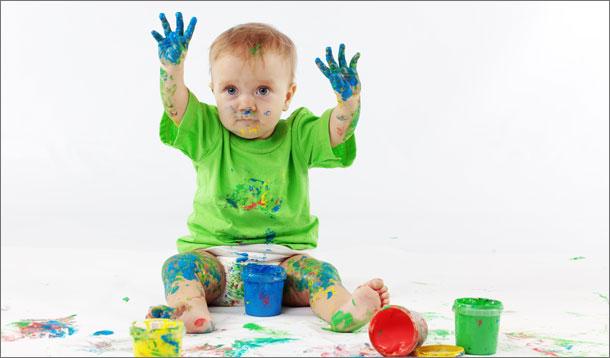Creativity is the ability to generate or make up stuff that is unique and often has practical or artistic value. It is also a way to look for new solutions to old, and more importantly new problems. When your child becomes an adult in the workplace, he will always encounter problems that may not be solvable through the old ways, and therefore requires thinking “outside the box”. A child who is used to thinking creatively will be a success in his profession and will be sought after by employers. Or better yet, he may even employ people to work on his innovative creative project!
Apart from the practical benefits of being creative, coming up with something new in itself is a source of pleasure.
Many artists actually create art, not for money, but to express themselves and give purpose to their lives. To many, it can be an important aspect of a happy, fulfilled life.
And of course, a creative child may also grow up to be able to produce something very valuable in his generation. A child whose creativity is well-nurtured, and have other traits like grit, persistence, and ability to do hard work may grow up to be the next Larry Page, Mark Zuckerberg, Jeff Coons or Frank Gehry.
The Genetic Root of Creativity
A large part of being creative is genetic. Scientists claim that some people are born more creative than others, and creativity seems to come more naturally to some kids than others. It is an innate talent, and the naturally talented person has an easier time acquiring the same level of expertise than the lesser talented person. Also, the talented person tends to master quickly what exists, so he can move on to working beyond what already exists and build something new.
Highly creative people are found to exhibit personality traits such as being intelligent, non-conformist and unconventional, and open to the experience. They have strong egos, and even have a mild form of madness. They also tend to have a broad range of interests. For example, highly creative scientists are found to be highly interested and engaged in the arts.
Although there are especially gifted creative people, experts believe that all people have creative abilities and all have them differently. It is also something we all have in various degrees. Kids are naturally creative. But because of societal pressure, creativity can be unlearned. And because of the lack of stimulation, creativity can also be undeveloped.
Characteristics of a Creative Child
You can tell if your child is naturally creative if you see him:
- finding new ways of using things, especially commonplace objects – like using a box as a toy fort, a vehicle, or a cave.
- finding new ways of solving a problem, sometimes intuitively and without using logic
- daydreaming a lot
- being independent, unconventional, has his own way of doing things, and does not care to conform with what other children do
- take risks and learn from consequences
- interpret his world by creating things like music, drawings, and stories.
- take something existing, and makes his own improvements and variation on it – he may take an existing game and create his own version, or an object such as a schoolbag and add decors to make it his own.
Genetic factors are main contributors to a person’s creative talent, but scientists do not negate that environmental factors play a big part in developing it in a person. Creativity can be developed so a person can achieve his potential. And the best time to foster creativity is from childhood.
Childhood is the time when your kid is still developing his powerful brain. It is also the time when he can freely explore and grow in the direction he wants, and not be constrained by how society wants him to think. It is the time when he picks up the habit of being creative. Indeed, nurturing his creativity is one of the most important gifts you can give to your child.
In general, you can foster your child’s innate creativity by exposing him to influences that can provide him with inspiration. This means cultivating his love of knowledge and reading. You should also provide materials for your child to apply his creativity. Also, give him time to be alone, to think, to reflect, to imagine, to fiddle about, to create.
Importantly, your child needs your encouragement and your non-critical acknowledgement of what he is trying to accomplish. Give him an environment that allows his creativity to develop, and not be stifled.
By doing this, you are instilling in your child the habit of creative thinking, which he will take into adulthood.
Here are some tips to raise a creative child:
- Make your child a reader – Among its many benefits, reading expands the intellectual horizon of your child, exposing him to new information and experiences that could potentially capture his interest, drive his passion and stimulate the urge to create. It sets up your child to imaginative thinking. Knowledge from reading also provides raw materials for your child to build upon. Reading informs your child about what exists, so he knows how to build on it.
- Expose him to literature, music, and the arts – Surrounding your child with creative works from other people will inspire him to produce creative works himself.
- Expand his horizon – He needs lots of raw materials as input, which his imagination could turn into a piece of creation. Do new things, go to new places. Make sure though that they are not forced into these, as it might backfire. For example, do not force your child to go to an art museum, if he knows he will hate it. Make him find learning enjoyable.
- Encourage your child’s interest – As long as your child is interested in anything that will not harm him, do not discourage him, but rather be involved in his interest. Talk to him about it not as a cynical adult but as a genuinely interested and open-minded friend. If you can afford it, consider giving your child things related to his interest that could further fuel his imagination.
- Accept his interest and passion no matter how they seem to be trivial or not worthwhile – It is your child’s interest and passion that fires his imagination. Something seemingly trivial might evolve or branch out into something big. For example, your child’s interest in superhero action figures may one day spark an interest in creative writing or robotics.
Source: raisesmartkid.com




